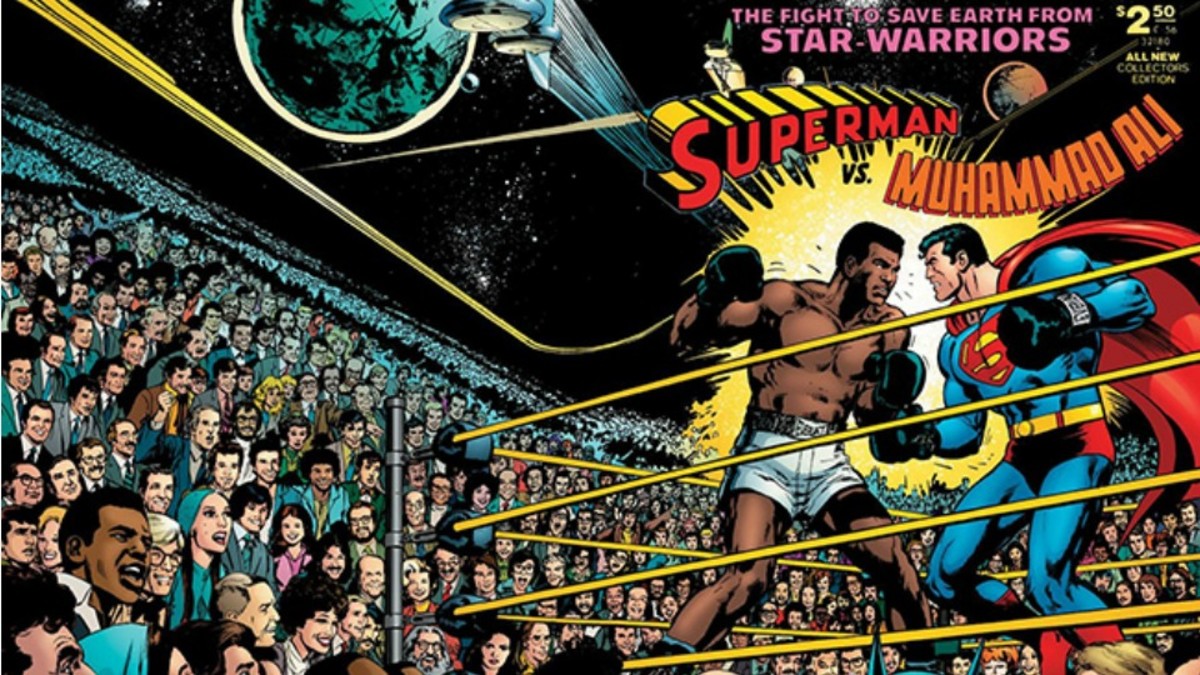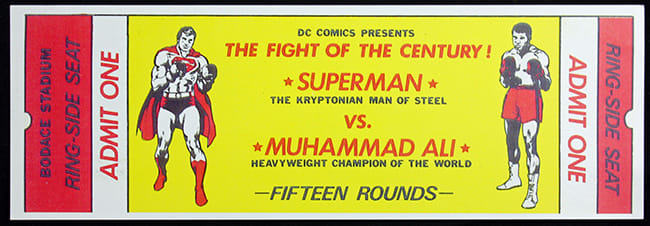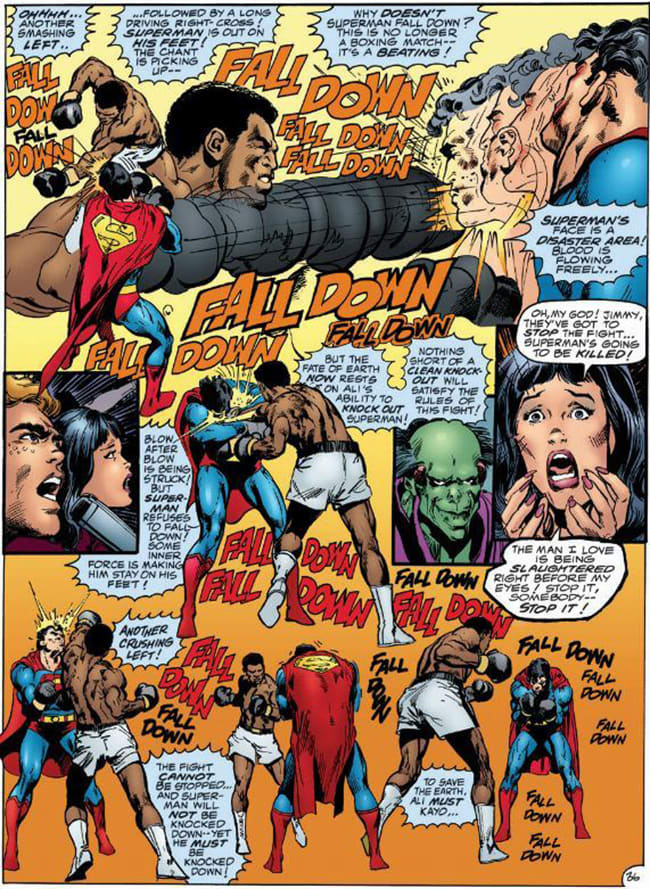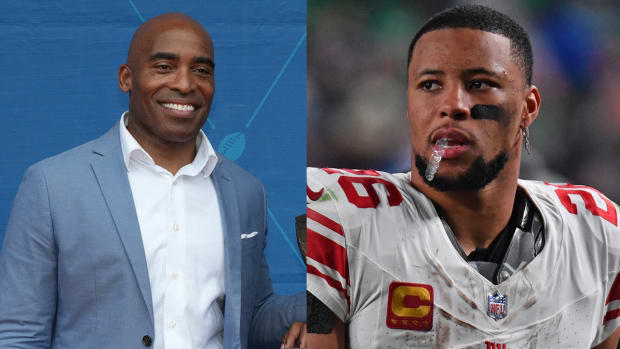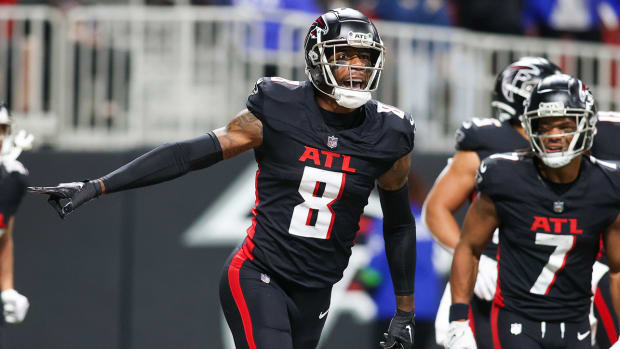Superman vs. Muhammad Ali: The origin of the greatest, strangest team-up in comic book history
This article first appeared on SIKids.com.
During his legendary career, Muhammad Ali defeated some of the best boxers in the universe: Sonny Liston, Joe Frazier, George Foreman — Hun’Ya of the Scrubb intergalactic empire?
That last fight might not be so familiar. But it happened, if only in a comic book. In 1978, DC Comics published one of the strangest, most enduring team-up books ever: Superman vs. Muhammad Ali. At the time, it seemed like a gag. A superhero and a real person fighting aliens in a an oversized comic? Today, it’s appreciated for its wild story, boundless creativity, and heroic treatment of a transformative, inspirational figure.
“A Superman/Ali comic book had to be not only an epic entertainment, but also an exploration of the ideals and actions that made Superman and Ali heroes around the globe,” wrote Jenette Kahn, DC Comics’ former publisher.
Depending on who you talk to, the idea for Superman vs. Muhammad Ali came from either Ali’s manager Don King, who pitched the Superman/Ali idea to Kahn, or Superman editor Julius Schwartz. But whatever the origin, the creative team of writer-artist Neal Adams and writer Denny O’Neil was always the first choice to handle the book. Adams, O’Neil, and Schwartz had collaborated on Green Lantern/Green Arrow in the 1970s, which had a groundbreaking sense of social awareness. According to Kahn, that made them the perfect choice to work on a project that would be laced with real-life issues.
“Here was our opportunity to say something about the world without actually getting involved in the political arena, but getting involved in the area of humanity and high adventure and fun and enjoyment,” Adams says, adding, “Once you realize that you’re going to have Superman and Muhammad Ali fight for the right to save the Earth, the story kind of writes itself.”
Still, the plot is pretty wild: Led by emperor Rat’Lar, an alien race called the Scrubb surrounds Earth with ships loaded with devastating weapons. Rat’Lar says the only way to save our world is if Earth’s greatest champion defeats Hun’Ya, the Scrubb’s fierce, hulking pugilist warrior. Naturally, Rat’Lar zeroes in on Superman and Ali as Hun’Ya’s most likely opponents. But they can’t agree on who should face Hun’Ya, so Superman and Ali are forced to box in front of billions of extraterrestrials and humans with the winner going toe-to-toe with the Scrubb champ.
That all sounds good, but there’s one big problem. Superman is, well, Superman. If a human punches him, the human’s hand breaks. “The first thing and the obvious thing was we had to level the playing field,” O’Neil says. “Ali was a superb athlete. Still, you know, Superman pushes planets around!”
The solution they came up with was to depower Superman. When he trains with Ali before the big, intergalactic fight, Superman uses a fragment of a red sun to dilute his powers. (Remember, Superman is powered by Earth’s yellow sun!) And then the bout itself happens in a ring orbiting a red sun. And let’s just say, on equal footing, Ali makes the Man of Steel know what it’s like to feel pain for real.
But as important as the boxing is, O’Neil and Adams were laser-focused on doing justice to the real-life person at the center of the story. Neither O’Neil (who left the book before it was completed) nor Adams (whose work makes up the bulk of the comic) wanted to insult Ali, disrespect him, or abuse the trust given to them by a man they both admired.
That started with getting his dialogue correct. O’Neil visited Ali at his training camp in the Catskills in upstate New York to watch him and listen for speech he could use. Adams, meanwhile, went with Ali’s quotes verbatim. “You will find certain sections of the book where he’s yelling at the bad guy where we’re quoting him directly,” Adams says. “Most of the speech patterns and the words and the phrases where Muhammad Ali’s.” And when it came to drawing Ali, Adams studied and researched him, his footwork, and the way he fights to create images of staggering authenticity. Some panels look like they could be photographs. “Respect for the fighter became tremendously important for me.”
The most crucial component to convey, though, was what Ali meant outside the ring. He fought against racial and religious persecution. He fought against the Vietnam War. He fought against social injustice. Ali was more than a boxer; he was a symbol of social justice that resonated well beyond America. (Superman vs. Muhammad Ali was printed, then reprinted, in numerous countries and languages.) That made him the perfect person to save the universe from an invading horde of aliens alongside a superhero like Superman.
“This was not a comic book that was done by accident,” Adams says. “This book rubs shoulders with Ali. It takes him out of the myth and makes him a human being. Heroes are meant to be walked down the street with. You walk down the street with them, you find out if they’re good guys. Some heroes are not good guys. Ali, very clearly, was a good guy.”
Nearly 40 years after its publication, Superman vs. Muhammad Ali is still one of the weirdest comics ever created, and one of the most miraculous. Real people show up in comics regularly today. But back then? Hardly ever — especially not someone the caliber of Muhammad Ali. Yet there he is, one of the most iconic, inspirational, and polarizing people of the 20th century, going toe to toe with Superman and a giant blue alien. And, incredibly, it all works.
The book was lightyears ahead of its time, and in today’s pop culture-obsessed world it stands as a fitting tribute and introduction to the Greatest of All Time. “Neither before nor after the publication of Supers/Ali has there been anything like it,” O’Neil says.
“Everybody laughed at [the idea],” Adams adds. “Nobody’s laughing anymore.”
Images: DC Comics, Marty Lederhandler/AP (Ali with book)
